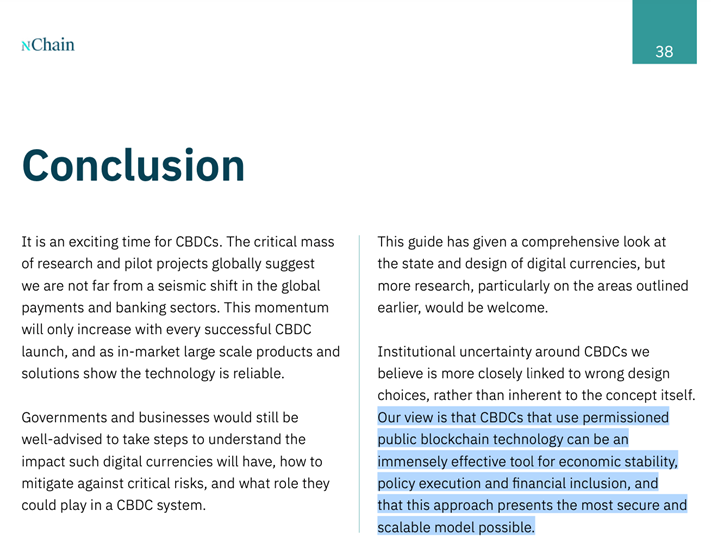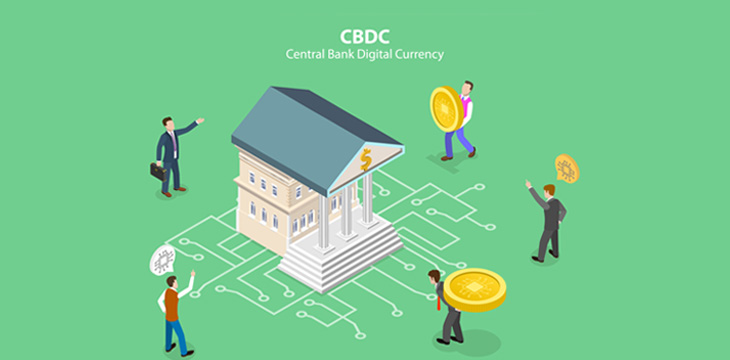|
Getting your Trinity Audio player ready...
|
When I read through nChain’s recently published CBDC playbook, I stumbled on quite an interesting part. On page 8 of the document, nChain presents the basics a functioning CBDC should follow, referring to the principles laid out by the Bank for International Settlements (BIS).
The BIS published an executive paper concerning CBDCs and their foundational principles as well as core features. It states:
The intent would be to allow public and robust private money to continue to coexist, including through convertibility and interoperability.
Coexistence of private money—well, that is fascinating. Revisiting nChain’s website, it shows that their products include “Digital Cash” and “Digital Money”:

A while ago, we discussed how Bitcoin is complex cash, and the inventor of Bitcoin, Dr. Craig Wright, pointed out in an article that Bitcoin can serve as the technical foundation of a digital currency:
I see Bitcoin becoming a global commodity-based transactional system, one can be used either directly or following the issuing and creation of central bank digital currencies running on top of Bitcoin.
And for your information, Dr. Wright is Chief Scientist at nChain.
CBDCs running on Bitcoin and simultaneously competing with Bitcoin
It was Dr. Craig Wright who drew our attention to the fact that with the BSV blockchain, we can have a CBDC running on Bitcoin while at the same time being able to switch back from the CBDC to the native Bitcoin token at any time.
What does that mean? Imagine you have your CBDC wallet on the BSV blockchain. The moment you stop trusting that CBDC—may be for political or economic reasons—you exchange that CBDC amount back to the BSV satoshis.
That would be the opposite of being trapped in a state money system. It allows for an escape route, and if the purchasing power of the CBDC is on its way down due to inflation. Back to BSV, then. What if there is a sudden need for a CBDC to pay for an item? You can convert back to CBDC again.
This way, we could participate in a CBDC system without staying in it. This puts pressure on the CBDC system, by the way, and in a good sense: if the CBDC does not deliver what it promised, people would run back into the native Bitcoin tokens by a click. CBDCs would have to compete against the commodity quality of Bitcoin as cash.
That is where digital asset exchanges could fulfill their true meaning. Not gambling and speculating on price appreciations of the latest nonsense-coin, but enabling instant switching back and forth between CBDC and Bitcoin.
Risks of a CBDC minimized when Bitcoin is in play
In the CBDC playbook of nChain, the risks of a CBDC were discussed, especially “loss of privacy.” The original Bitcoin, as in the BSV blockchain, is a handy tool to enhance privacy at scale, though.
Privacy is guaranteed if Bitcoin scales—which it does on the BSV blockchain. The more transactions run on Bitcoin, the harder it gets to follow anyone’s transactions easily. Dr. Wright stated in his article “Solving Double-Spending” that:
Bitcoin balances such dichotomy by achieving privacy through scale. While every transaction retains full traceability, the cost of monitoring all users globally is prohibitive. Moreover, suppose users maintain separate keys for every transaction and firewall their identities. In that case, it becomes infeasible for people to randomly determine other people’s identities or even to link identities. The creation of filters, controls, and software can simplify the issue and allow payments that are not joint and hence do not expose the identity of the user or link transactions.
Now take all these into consideration: Bitcoin enhances privacy at scale, and at the same time, it is a commodity-based cash that allows for monetary risks of a CBDC to be mitigated. In addition, the CBDC itself can be running on Bitcoin. As nChain points out on their product site, Bitcoin is a tool to have digital cash and digital money. These are not the same.
The BIS wants private money to be in coexistence with CBDCs. However, private money is not currency notes issued by governments. Do you see where all of this could be going now?

Get nChain’s latest CBDC playbook here: https://info.nchain.com/cbdc-conference-playbook
Watch: The BSV Global Blockchain Convention presentation, CBDCs and BSV

 02-15-2026
02-15-2026 




